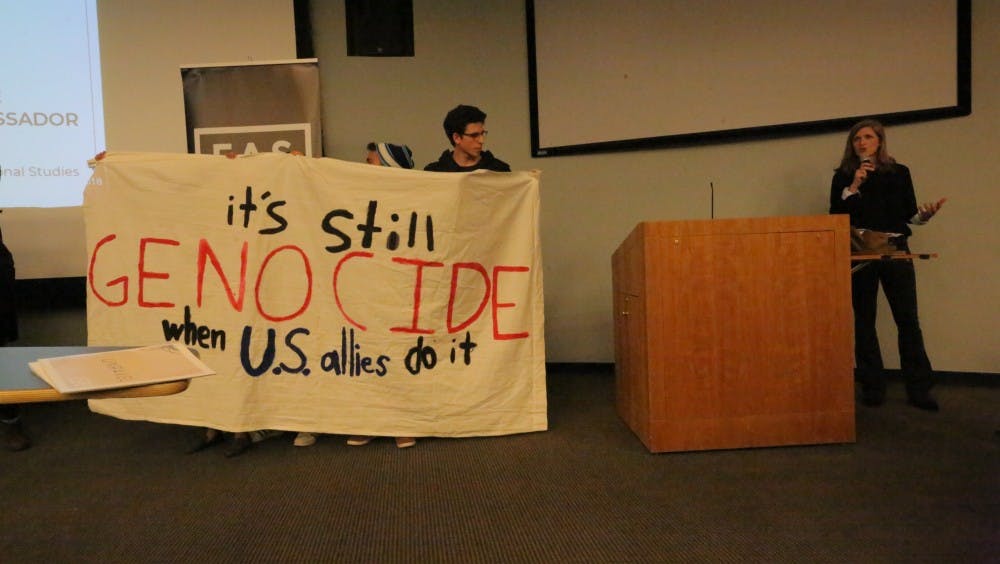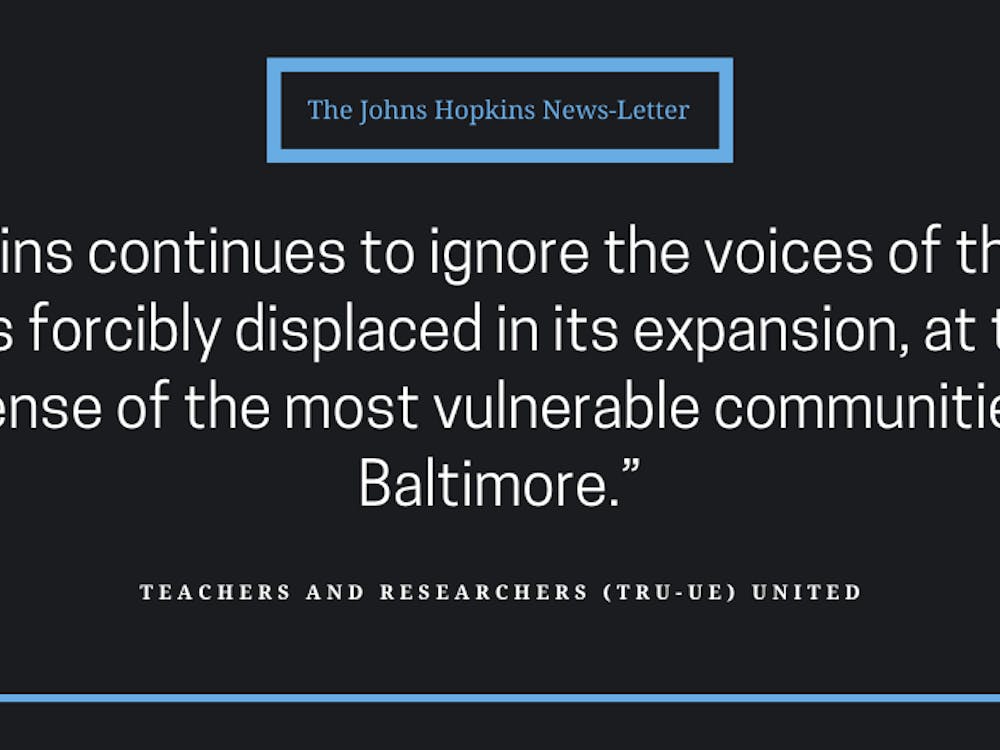Former U.S. Ambassador to the United Nations Samantha Power spoke about the importance of diplomacy and national unity as part of the Foreign Affairs Symposium (FAS) on Tuesday.
Power, who served as ambassador from 2013 to 2017, presided over the Obama administration’s foreign policy initiatives. During her tenure, she advocated for the controversial 2011 military intervention in Libya, as well as U.S. support for the Saudi-led bombing of Yemen — a decision that many decry as having contributed to starvation and civilian deaths in the country.
In response to these decisions, protesters from Students for a Democratic Society (SDS) staged a silent protest in front of the audience while she spoke. The event ended with a Q&A session during which she addressed the demonstrators’ criticisms.
Power began her prepared remarks by elaborating on the divisiveness that has plagued America and the steps ordinary people can take to bridge that gap.
She recounted how, during the internment of Japanese Americans in World War II, it took only a few citizens to fight back against nationwide prejudice. She stated that the division that racked the U.S. in the 1940s is apparent today and that we need young people to overcome their pessimism to breach the divide.
“We all, these days, need a dose of perspective, and for me history often provides it,” Power said. “The salience of political identity seems now to be transcending that of parents, fellow children of parents, neighbors and community members. All of those forms of identity seem to be melted away, and party identity now looms so much larger.”
She noted that staunch partisanship spelled disaster for the U.S., both domestically and abroad.
“These divisions lead to real ramifications in the area of national security,” Power said. “Sowing division in this country has always been something our adversaries thought was in their interest, regardless of whether or not it was during elections.”
Power believes that the U.S. is in a time of crisis, pointing to Russian interference in the election and U.S. President Donald Trump’s hostility towards the press as examples. She stressed that the U.S. needs capable young people to address the nation’s problems.
“In our diplomacy, we need not only youth, modernity and energy to be part of our Foreign Service and diplomatic core, but we also need to bring again this spirit of reaching out,” Power said.
She urged young people to not be dissuaded by what she described as today’s seemingly insurmountable difficulties. Instead, she argued that they should see the value in small, yet equally important, democratic actions they take.
“The question I get from students and from others who are feeling upset about how things are going right now is, ‘What can one person do?’” Power said. “For most of us, the change that we make is going to be incremental. But the message I want to leave you with is that there’s always something that we can do.”
For audience members like freshman Kavya Anjur, Power’s message on the importance of small actions resonated.
“As a freshman coming here, I never thought I’d be able to meet people who have had such an important effect on society,” Anjur said. “But we don’t have to be in high positions of power, like her, to voice our opinions and make changes in the world.”
Others, like senior Tim Shieh, enjoyed Power’s descriptions of carrying out decisions that she did not necessarily agree with.
“Every decision has many different perspectives on it that are hotly debated,” Shieh said. “I thought it was both interesting and vulnerable when Ambassador Power opened up that she didn’t personally agree with many of the things she carried out while she was in that position.”
In their silent demonstration, SDS members walked to the front of the auditorium displaying banners that read, “Samantha EmPowers Genocide in Yemen” and “It’s Still Genocide When U.S. Allies Do It.”
Emeline Armitage, co-president of SDS, said she felt motivated to speak out against Power’s involvement in the current crisis in Yemen.
Armitage elaborated that Power authorized U.S. support for Saudi Arabia, whose military intervention in Yemen has led to the deaths of thousands of civilians, as well as widespread famine and the displacement of over three million Yemeni citizens.
“We were confronting her about her past actions,” she said. “Whether or not she gave any type of answer, it doesn’t erase the fact that there are still people dying in Yemen to this day because of her.”
Though SDS demonstrators left the event before the Q&A section, Power responded to the group’s condemnations, discussing the presence of U.S.-backed military in Yemen.
“It became very clear that the coalition was basically disastrous for the civilians of Yemen,” Power said. “At that point, we made a choice. My view is that we should have pulled the plug. But there was an argument on the other side that asked what would happen when we pulled the plug. Will they keep fighting? Will Saudi Arabia get arms from Russia or somewhere else?”
Though she recognized the extent of Saudi Arabia’s war crimes, Power argued that she made attempts to reconcile the situation.
“There was a second phase where we were trying to use our leverage to change how they targeted things,” Power said. “We also used this leverage to let them let goods in. One of the things I did was create an inspection mechanism which allowed goods to actually come into Yemen.”
Armitage argued the contrary, citing the continued destruction and starvation in the area. In Yemen, she said, the Gulf Cooperation Council is continuing to blockade food, completely starving the country.
“They continue to bomb civilians and hospitals and places of worship,” Armitage said. “Samantha Power’s hands are all over this. During her tenure as ambassador, she supported this, and to this day she has not spoken out against it. These genocidal policies against Yemeni to this day continue with the support of the United States.”
She added that though Power articulated her ideals surrounding the conflict, the ambassador has done little to ease the situation.
“What you believe is shown through your actions, not your words,” Armitage said. “She can say anything she wants, but the reality of the situation is that she supported and empowered genocide during her tenure as ambassador. Whatever she says now can’t erase that fact unless she actively makes material reparations to reverse her actions, which she hasn’t done.”
Armitage urged the student body to take a more active role in global affairs. She argued that student participation in democratic action and protests challenges policy-makers who contribute to global conflicts.
In a statement to The News-Letter, the organizers of FAS said that they were inspired by Power and commended her engagement with the protesters.
“[Power] discussed how we are in a period of extreme polarity at this moment, during which activism and initiative are key to improvement,” they wrote. “Indeed, Power was happy to engage with the protesters who emerged halfway through her speech. As an organization, we were motivated by Ambassador Power’s anecdotes and advice, as well as the increased engagement of Johns Hopkins students and community members.”
Graduate student and former FAS member Corey Payne was sympathetic to the protesters. He wrote in an email to The News-Letter that he was shocked that so many people in the audience were heckling them and responded to criticisms that SDS chose to disrupt the talk rather than ask Power questions about her position on the Yemeni crisis.
“I know there were people complaining because the protesters didn’t stay to ask questions,” he wrote. “The protesters were respectful and made their point. Frankly, I find it ridiculous that people are more upset that the protesters didn’t ask questions than they are that the U.S. government sponsored a genocide in Yemen.”
Freshman Kavya Anjur appreciated that the University did not interfere with the protest.
“It was rather abrupt, but again, we have the First Amendment. It’s something that you can expect. It shows how active the Hopkins community is in allowing students to express themselves freely,” she said.























Please note All comments are eligible for publication in The News-Letter.